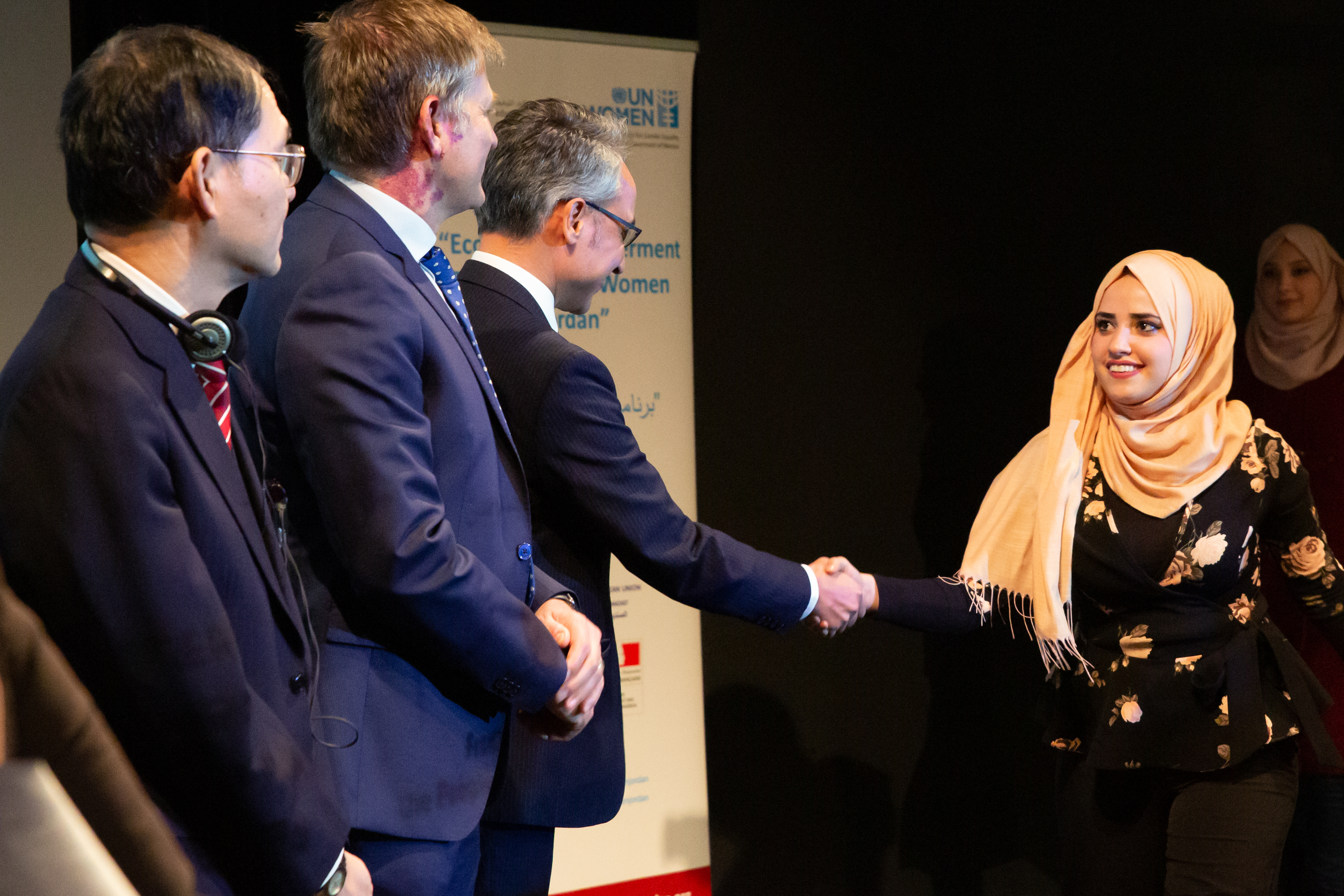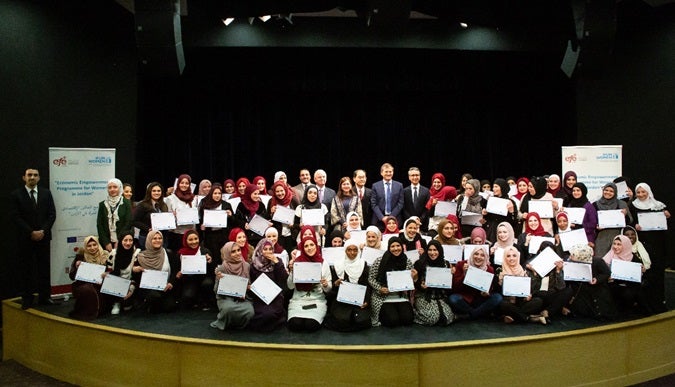Call centre training boosts self-confidence and nets women jobs
Safa al-Afeer and Raghad Khaled dreamed of becoming successful career women after graduating from university, but their paths to employment didn’t go quite as planned.Date:

Participants on the UN Women and EFE-Jordan under the economic empowerment programme receive their completion certificates during a graduation ceremony. Photo: UN Women/ Lauren Rooney
Growing up in the desolate town of Azraq in eastern Jordan, where job opportunities are scarce for women, 25-year-old Safa Al-Afeer made it her goal to get a university degree, have a successful career and leave her small town behind. After obtaining her Bachelors’ degree in Italian and English from the University of Jordan, Al-Afeer got married and moved to Amman. It seemed like the perfect opportunity to gain work experience and the lifestyle of her dreams. However, things didn’t unravel as planned.
“My dream quickly turned into a nightmare,” she said. “I felt worthless and depressed, especially after seven months of searching for a job, with no luck.”
Even in big cities, Jordanian women face difficulty finding jobs. Although women comprise 45 per cent of all university graduates, Jordan’s female labour force participation rate stood at just 14 per cent in 2018, compared to 60 per cent for men. It among the lowest rates in the region, and the world – earning Jordan a rank of 138th out of 144 countries on the World Economic Forum’s Global Gender Gap Report.
Although Al-Afeer had almost lost hope of finding work, everything changed when she enrolled in a Call Centre and Customer Service Training provided by Education for Employment (EFE-Jordan), in partnership with UN Women.
“At first, I was skeptical... I never thought I would enjoy a career in customer care. But the course sparked my curiosity and my inner eagerness to gain employment drove me to enrol,” explains Al-Afeer, who completed the course alongside 22 other young women.
The four-week intensive training course hones technical skills on client etiquette, interview preparation, CV-building and stress management.
 The interactive approach increased my classroom engagement and improved my understanding. It gave me the confidence to speak up in class and ask questions.”
The interactive approach increased my classroom engagement and improved my understanding. It gave me the confidence to speak up in class and ask questions.”
— Safa Al-Afeer, UN Women and EFE-Jordan Programme Alumni.
She says the most challenged aspects were the interview sessions. “I remember the first time I was interviewed, the process felt long and painful. I kept stuttering and losing my train of thought. It was a nightmare! But my training with EFE-Jordan gave me a confidence boost. I can now perform an interview while feeling totally at ease.”
According to one of Al-Afeer’s instructors, “After completing the training course, Safa understood the importance of language in the modern world, especially in business. Her great passion for learning gave her the ability to quickly adapt and improve her interviewing skills.”
Experiencing similar difficulties entering the job market, 24-year-old Business Administration graduate Raghad Khaled, expected to find a job directly after graduation. But after a five-month job search with no luck, she was reaching the point of despair: “There were days when I didn’t even bother getting out of bed because I didn’t have anything worth doing.”
Then, one day she read the success stories of women who had previously taken the EFE-Jordan trainings, such as Al-Afeer, which inspired Khaled to sign up. The training also provides women with life-skills. Khaled says she did not realize her self-confidence had been one of her greatest obstacles.
"I learned so much from the life-skills training, such as how to market myself to employers. It’s a skill everyone needs to know, no matter which career path they choose. A lot of students graduate from university not knowing how to prepare for such a life-changing event. I believe that if someone is not well-prepared, they can easily self-sabotage their chances for employment.”
Raghad’s instructor, says the training course taught Khaled the value of communication. “What makes her stand out is her ability to empathize and listen to people. This trait will make her an invaluable asset in any field.”

100 graduates from the “Economic Empowerment Program for Women in Jordan" programme led in partnership with UN Women and EFE-Jordan, convene for a group picture during the graduation ceremony. Photo: UN Women/ Lauren Rooney
After taking the four-week course with EFE-Jordan, Al-Afeer and Khaled soon found jobs. Al-Afeer is now an Executive Secretary and Public Relations Manager at telecommunications company Artelco. Meanwhile, Khaled is working as a Call Centre Agent at Crystal Call, while also using her newfound confidence to help other women enter the job market:
 Many still believe that women don’t belong in the workplace… I want to work on changing the stereotype, so women can enjoy more fulfilling lives.”
Many still believe that women don’t belong in the workplace… I want to work on changing the stereotype, so women can enjoy more fulfilling lives.”
— Raghad Khaled, UN Women and EFE-Jordan Programme Alumni.
This training initiative complements capacity-building opportunities and vocational training programmes for unemployed Jordanian and Syrian women offered by EFE-Jordan under an economic empowerment programme run in partnership with UN Women. Funded through the generous support of the EU Regional Trust Fund in response to the Syrian Crisis (the"Madad Fund") and the Governments of Japan and France, the programme will provide comprehensive training services and facilitate job placement for 1,000 women in Jordan, in the span of 18 months.